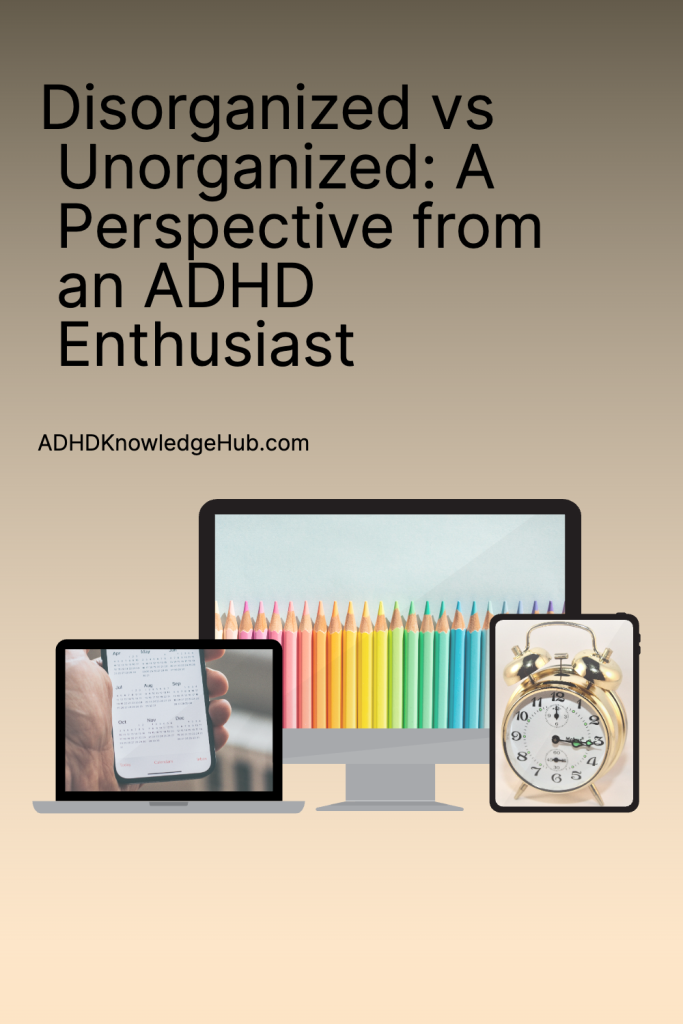Disorganized vs Unorganized: A Perspective from an ADHD Enthusiast
Navigating through life with ADHD can feel like traversing a labyrinth. You may find yourself wondering – am I just disorganized or is it unorganized? What’s the difference between Disorganized vs Unorganized? And how does this relate to my ADHD? Well, sit back, my friend. As someone who’s been there and got the t-shirt, I’m here to share my insights and practical solutions for self-regulation.
Understanding the Key Differences
First things first, let’s get our terminology straight. Though often used interchangeably, ‘disorganized’ and ‘unorganized’ have distinct nuances. Disorganization implies a state of disorder or confusion, often due to lack of planning. Unorganization, on the other hand, refers to a lack of structure or system.
The ADHD Context of Disorganized vs Unorganized
The Relationship Between ADHD and Disorganization
In the realm of ADHD, disorganization can manifest in various ways. It might be forgetting appointments, losing items, or having a cluttered workspace. It’s as if your life is a jigsaw puzzle with pieces scattered all over the place.
The Link Between ADHD and Unorganization
When it comes to unorganization, it’s more about lacking a coherent system or routine. This could mean not having a consistent sleep schedule, forgetting to eat meals at regular times, or struggling with time management.
Practical Implications and Solutions
Strategies to Manage Disorganization in ADHD
For tackling disorganization, the key is to have a system that helps keep track of tasks and appointments.
Product Recommendation 1: Planner
A planner, for instance, can be a game-changer. It offers a tangible, visual way to organize tasks and appointments. You can get a decent one for $20-$30.
Product Recommendation 2: Task-Management App
Alternatively, a task-management app like Asana or Trello ($0-$15/month) could also help you stay on top of things and ensure nothing falls through the cracks.
Techniques to Address Unorganization in ADHD
For unorganization, you need a system that provides structure to your day-to-day life.
Product Recommendation 3: Organizational Tool Set
An organizational toolset that includes things like magnetic whiteboards, wall calendars, or baskets can help. Depending on the quality and brand, you can find these for around $30-$60.
Product Recommendation 4: Digital Organizer
You could also consider a digital organizer like Motion, Evernote or Google Keep. These can be free or cost up to $10/month for premium features.
Personal Experience of Disorganized vs Unorganized
I’ve tried all these products myself and found them to be incredibly helpful in addressing my own disorganization and unorganization due to ADHD. They have really helped to bring some order and structure to my somewhat chaotic world.
Reasons for My Suggestions for Disorganized vs Unorganized
These suggestions aren’t just based on personal experience, but also on the latest research on ADHD management. Creating external systems to manage tasks and provide structure is considered one of the most effective strategies for managing ADHD symptoms.
Conclusion – Disorganized vs Unorganized
Understanding the distinction between disorganization and unorganization can be a significant step in managing ADHD symptoms effectively. Each requires different strategies, tools, and methods. So remember, my friend, with a little help and the right tools, we can navigate this ADHD labyrinth more easily.
FAQ
- What’s the difference between disorganized and unorganized?
Disorganization implies a state of disorder, often due to a lack of planning. Unorganization refers to a lack of structure or system. - How does ADHD relate to disorganization and unorganization?
ADHD often manifests in symptoms of both disorganization (like forgetting appointments or losing items) and unorganization (such as not having a consistent sleep schedule or struggling with time management). - What are some tools to help manage disorganization due to ADHD?
Planners and task-management apps can be very useful for managing disorganization. - What are some strategies for dealing with unorganization in ADHD?
Organizational tool sets or digital organizers can provide structure and assist with managing unorganization. - Are these suggestions based on personal experience or research?
Both. While I’ve found these strategies effective in my own life, they are also backed by current research on ADHD management.

*We may earn a commission for purchases made using our links. Please see our disclosure to learn more.




